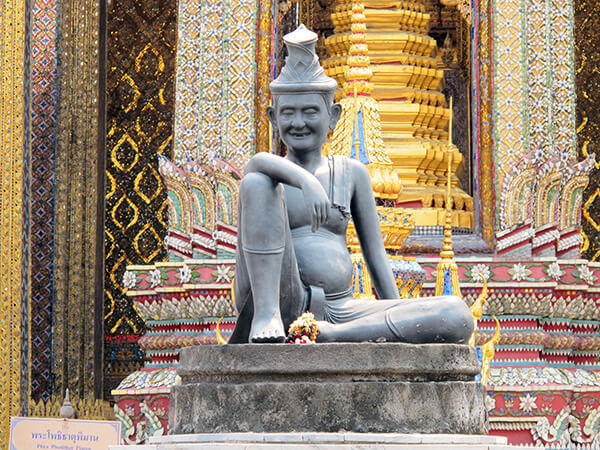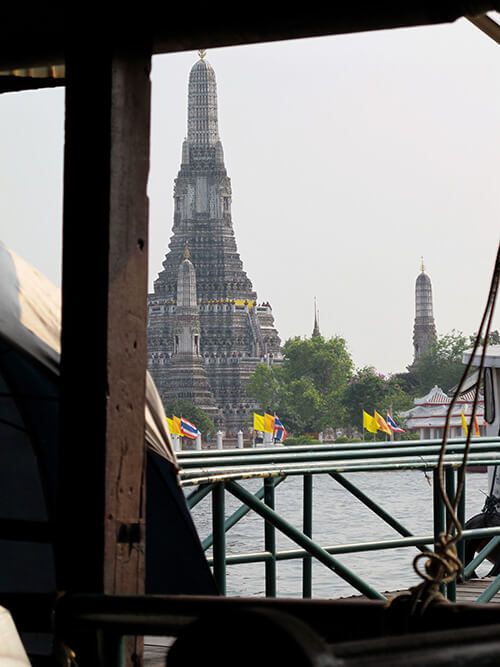Experience Bangkok, Thailand by Learning Thai
Language Immersion While Living in the Kingdom
Article and photos by Paul King
6/2014

|
|
Grand Palace, Bangkok, not far from Thammasat University campus.
|
When I was an English teacher in southern Thailand, living in a small town not far from the Andaman coast, I took a bus across the Malay border while on school holiday. In typical fashion, I met and became friendly with the motley gang of travelers staying at my hostel, tucked away as we were among the rolling tea fields and lush jungles around Tana Ratah. Katarina, an 18-year-old German girl fresh out of Gymnasium, was backpacking around Southeast Asia on her gap year. She had flown into Singapore and was making her way overland, heading north.
“So Thailand’s next for you, then?” I asked, making conversation as we sat around, playing cards and reading our books.
“Oh no!” she cried, seemingly repulsed. “I’m skipping Thailand. Too many tourists — Thailand’s been done already.”
I nodded, not wanting to continue the conversation. It was a refrain I had heard many times and would continue to hear during my three years spent hopping around Asia.
Thailand, for many, is a country that’s been “discovered;” past its prime, it lacks “authenticity,” and its charms are now too tailored to the Western tourist, to the point where one feels as if a trip through old Siam is like being ushered through an exhibit at a museum: floating market, check; Grand Palace, check; giant reclining Buddha, check.
There is good reason for these widespread opinions, after all: Head north to the ancient city of Chiang Mai, and you will find innumerable tours offering glimpses of “untouched” hill tribes, where the women have a tradition of wearing thick, brass metal chokers that, over time, give them highly elongated necks. The origins of this practice have drifted into obscurity, as what was once an idiosyncratic custom of an indigenous minority has arguably become much less about the tradition and much more about collecting tourist dollars as travelers arrive in droves to gawk and snap photographs while the women smile wanly and glance every so often at their smartphones.
A sad state of affairs, clearly — but are situations such as these really indicative that Thailand, as an entire country, has been “spoiled,” “discovered,” and that everything there is to do, see, or experience has “been done,” as the young German backpacker would have it? I think the answer is unequivocally “no” — that the authenticity and richness of a culture and its people can never truly be spoiled by overexposure. Like a sand crab that scurries beneath the ground as soon as it’s unearthed by prying hands, perhaps the “authenticity” that all travelers seem to crave dives deeper and becomes harder to find once a culture opens itself up to mass consumption. And if this is true, then it is arguably especially true in Thailand, where a simple smile is usually a wonderfully skilled deception, hiding a vast range of human emotions. After all, the understated, subdued smile of a serene golden Buddha contains the secret of nirvana itself.
In this day and age of easy and convenient travel, if you genuinely wish to see and experience Thailand for what it is, you will need more than just a plane ticket to Bangkok and a Lonely Planet guide. You will need a key to open the door to the entire culture — a key that is that set of mysterious, beautiful runes and fluttering, birdlike tones that is the Thai language. The way to immerse yourself in the richness of the Thai culture — which has been there all along, despite protests to the contrary — is to learn Thai and experience everything firsthand.

|
|
View of iconic Wat Arun from Tha Tien Pier within walking distance of Thammasat University in Bangkok.
|
Language School Options in Bangkok
For foreigners interested in studying Thai in Thailand, a variety of options are available, including accredited universities and language schools.
-
AUA Language School. For those travelers to Thailand who want a more flexible schedule to work or travel, studying full-time at a university is not the best option. Luckily, another great choice is to study with the American University Alumni Association, the AUA Language School. AUA is Thailand's oldest and most respected language school, with branches throughout the country, not just in Bangkok. The difference in studying with AUA is that, unlike universities, their classes are taught using the Automatic Language Growth method, or ALG. This means that the lessons, even at the most basic and beginner levels, are taught through complete immersion in Thai, and no English is used in the instruction. AUA claims great success using this methodology, and its outstanding reputation and the myriad positive testimonials of current and former students support this reality. More information about their programs can be found on their website (Note that you will have to first choose where you’re interested in studying — Chiang Mai (northern Thailand), Rayong and Pattaya (southeastern coast), or Cham Churi Square (downtown Bangkok). Each location has different course offerings.)
-
Chiang Mai University — Learn Thai. If studying in the bustling metropolis of Bangkok might not appeal to you, heading north to the quieter city of Chiang Mai might be a better option. Chiang Mai University, or CMU, is another highly regarded academic institution in Thailand, and it offers a one-year program in Thai language and culture for foreigners. It is less intensive than many of the courses offered in Bangkok — only six hours of instruction per week for twelve months, with classes held during the evenings and on weekends. This program might be ideal for someone looking to work, travel, and have Chiang Mai as their home base. More information can be found on their website.
Why Study Thai in Bangkok?
Thailand, unlike many other Asian cultures, has more openly embraced Western ideas and tourists. Yet, it remains a unique culture. Without knowledge of Thai, a traveler might miss this reality, seeing the country and its people only through the limited lens of English. By learning Thai, you can converse and interact with Thais in their native tongue, unveiling the true uniqueness of the culture, like a sand crab emerging from beneath the waves.
The truth is that Thailand has not been “done,” nor has it been “discovered,” or any of the other overly simplistic sentiments that many a jaded backpacker may toss around. Our ability to experience the richness of any culture depends proportionately on our ability to access that culture, using the key of language as our passport. Luckily, for the empathetic traveler interested in experiencing Thailand on a deeper, more satisfying level, learning the Thai language in this unique Kingdom can be an extraordinary option to do just that.
Upon graduating from the University of Delaware, Paul King moved abroad to Thailand, where he lived, studied, and worked for three years.
|
